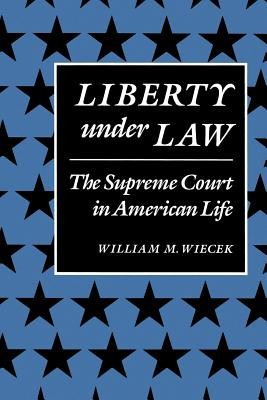
- We will send in 10–14 business days.
- Author: William M Wiecek
- Publisher: Johns Hopkins University Press
- ISBN-10: 0801835968
- ISBN-13: 9780801835964
- Format: 15.3 x 22.9 x 1.7 cm, minkšti viršeliai
- Language: English
- SAVE -10% with code: EXTRA
Reviews
Description
The two-hundredth anniversary of the U.S. Constitution and the intense debates surrounding the recent nominees to the Supreme Court have refocused attention on one of the most fundamental documents in U.S. history -- and on the judges who settle disputes over its interpretation.
Liberty under Law is a concise and readable history of the U.S. Supreme Court, from its antecedents in colonial and British legal tradition to the present. William M. Wiecek surveys the impact of the Court's power of judicial review on important aspects of the nation's political, economic, and social life. The author highlights important decisions on issues that range from the scope and legitimacy of judicial review itself to civil rights, censorship, the rights of privacy, separation of church and state, and the powers of the President and Congress to conduct foreign affairs.
Wiecek's own beliefs about the Court and the Constitution are unabashed and clearly stated. He expresses admiration for John Marshall while critically reviewing the mixed achievements of Marshall's successor, Roger Taney, author of the infamous Dred Scott opinion, which upheld the legitimacy of slavery. And he offers sharp criticism of the Court's "formalist" era in the early twentieth century, when judicial obstructionists "sought to shield a minority of wealth from the effects of democratic politics."
Throughout, Wiecek underscores the importance of disagreements over just what law is, and over the Court's role in interpreting that law. In so doing, he broadens the context for current debates about the Constitution and efforts to establish what some have called a "jurisprudence of original intention." The mirror of history, heshows, reveals the limitations of such a narrow scope of interpretation.
EXTRA 10 % discount with code: EXTRA
The promotion ends in 22d.20:37:07
The discount code is valid when purchasing from 10 €. Discounts do not stack.
- Author: William M Wiecek
- Publisher: Johns Hopkins University Press
- ISBN-10: 0801835968
- ISBN-13: 9780801835964
- Format: 15.3 x 22.9 x 1.7 cm, minkšti viršeliai
- Language: English English
The two-hundredth anniversary of the U.S. Constitution and the intense debates surrounding the recent nominees to the Supreme Court have refocused attention on one of the most fundamental documents in U.S. history -- and on the judges who settle disputes over its interpretation.
Liberty under Law is a concise and readable history of the U.S. Supreme Court, from its antecedents in colonial and British legal tradition to the present. William M. Wiecek surveys the impact of the Court's power of judicial review on important aspects of the nation's political, economic, and social life. The author highlights important decisions on issues that range from the scope and legitimacy of judicial review itself to civil rights, censorship, the rights of privacy, separation of church and state, and the powers of the President and Congress to conduct foreign affairs.
Wiecek's own beliefs about the Court and the Constitution are unabashed and clearly stated. He expresses admiration for John Marshall while critically reviewing the mixed achievements of Marshall's successor, Roger Taney, author of the infamous Dred Scott opinion, which upheld the legitimacy of slavery. And he offers sharp criticism of the Court's "formalist" era in the early twentieth century, when judicial obstructionists "sought to shield a minority of wealth from the effects of democratic politics."
Throughout, Wiecek underscores the importance of disagreements over just what law is, and over the Court's role in interpreting that law. In so doing, he broadens the context for current debates about the Constitution and efforts to establish what some have called a "jurisprudence of original intention." The mirror of history, heshows, reveals the limitations of such a narrow scope of interpretation.


Reviews